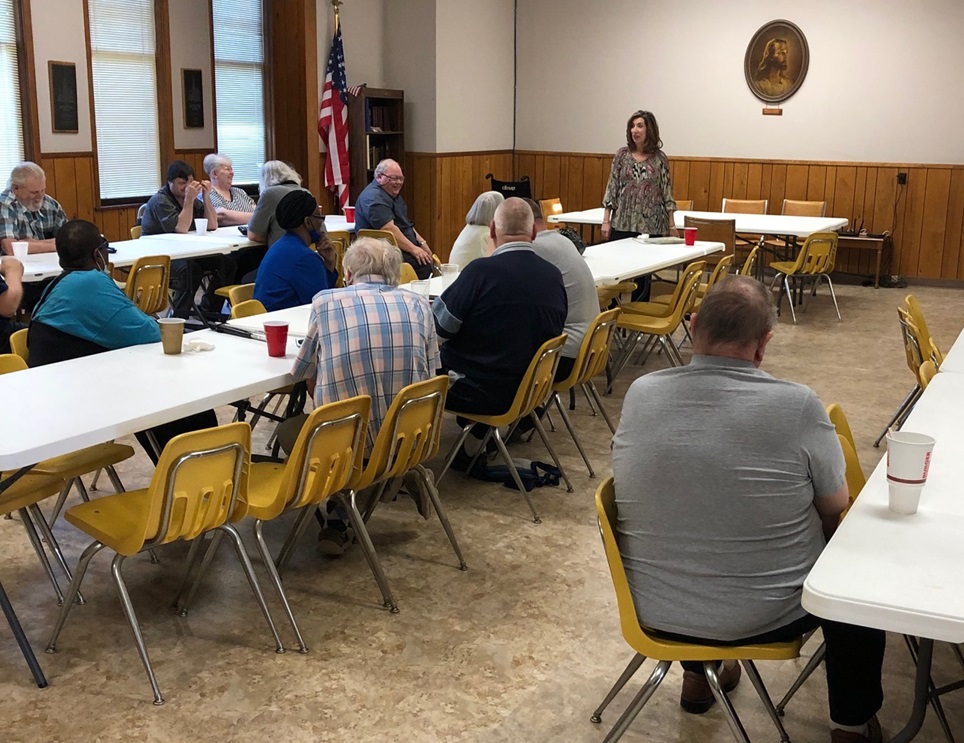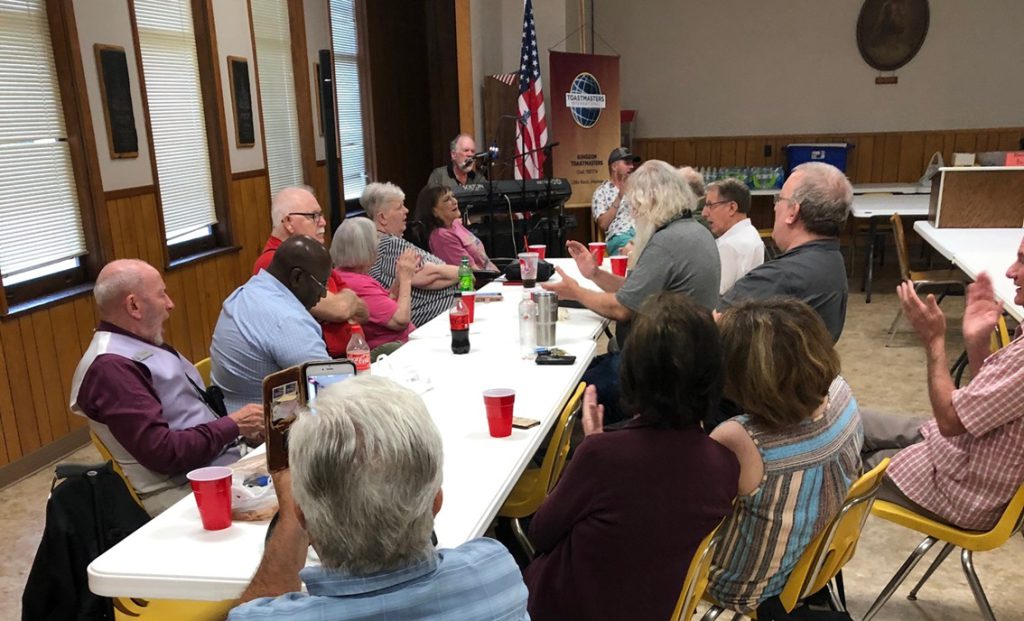PENTECOST 16 (PROPER 19), SEPTEMBER 12, 2021
Theme: Words that destroy and create
Text: James 3:1–12
Other Lessons: Isaiah 50:4–10; Psalm 116:1–9; Mark 9:14–29
• In the Name of the Father…Amen.
• The Epistle lesson serves as our sermon text for this morning.
• Dear brothers and sisters in Christ, let us pray:
Lord, let us walk in integrity and show forth Your love. Amen.
• Grace, mercy, and peace be yours from God the Father through our Lord and
Savior Jesus Christ. Amen.
• Introduction
We live in an age from which there has emerged an accepted norm of
continual outrage—seething disgust, open anger, and vitriolic attacks
directed at issues, events, and other people.
• A “protest” culture is on the upswing, oftentimes getting way ahead and
in the way of those trying to undertake sincere, meaningful actions toward
beneficial change.
• Sticks and stones indeed break bones—a violent mob roaming the streets
gives hard evidence of that—but in these gray and latter days, it often
seems that words, especially those spoken with ill will, have lost even
more of whatever little value they had left as a means of influencing our
fellow human beings.
• One commentator recently suggested that the verbal tools of outrage have
now reached a sad state of “hyperinflation.”
• Like a dollar that shrinks to nothing in its purchasing power, our words
have devalued to the point that almost every line of verbal reasoning—it
matters not whether such words are rational or irrational—has lost its
power.
• One can no longer say anything surprising enough, shocking enough, or
just plain sensical enough that it will really grab anyone’s attention or
make a difference—much less contribute to the resolution of disputes
between opposing parties.
• Rather than talking with one another, we insincerely talk past or
forcefully talk at our neighbors.
• One might rightly ask, “How did ever we arrive here?!”
• A. James, under timeless truth given from the Holy Spirit, firmly takes
issue with the notion that human speech has somehow “lost its luster.”
• The brother of our Lord Jesus begs us carefully to consider our own life
experience and to acknowledge once again the fiery power of our words,
whether they be:
Harmful that they destroy.
Beneficial that they create
• 1. So that our sin-infected tongues would be gladly directed to a higher
purpose:
• the glory of God and the blessing of Christ’s body.
• Wherever and whenever we fail with our tongues:
o In destructive words that thoughtlessly emerge
o in words of comfort, healing, and reconciliation that are intentionally
withheld—
o altering the course of life for the worse.
•
• James asks you vigilantly to remember that The Human Tongue Is Capable of
Inflicting Great Damage, but Christ Has Restored Your Tongue to Accomplish
His Good.
• I. Our tongues have achieved master status at setting “fires” (verses
2–6).
• Damaged ever since the fall, as devilish arsonists, our tongues speak in
sinful, self-centered arrogance and/or with intent to do murderous harm to
our neighbor’s reputation (verses 7–10).
All these kinds of wicked speaking are especially contrary to the First,
Second, and Eighth Commandments.
And we know this all too well!
• 1. In some instances, this is willful iniquity.
• Holy Scripture sets forth numerous examples of blasphemy against God and
false witness against neighbor.
Talking over the back fence with one neighbor about another neighbor.
We are not immune to this in the church.
Where is john? He has not been to church in months.
Did you see that horrible outfit Mary wore to church?
•
B. Likewise, our contemporary culture is screaming with painful examples
of the damage the “tongue” can cause wreaks.
• James’s lament about the harmful capacity of the tongue applies not just
to face-to-face conversations and confrontations.
• We poor, miserable sinners have become quite adept at making use of the
plethora of communications technologies currently at our fingertips.
Airing the dirty laundry out on Facebook, Twitter, Instagram, etc. for
all the world to see.
People nowadays talk like they have no “filter”.
At other times, we don’t even realize when or how we’ve set something or
someone ablaze.
Do we honestly care if we did?
•
B. James warns us even as regards our tongues speaking in God’s name.
• Redeemed by the shed blood of God’s Son, as baptized saints, we ought to
speak God’s truth in love to everyone, in full testimony to the source,
content, and glory of the Gospel: Jesus Christ.
• All who are in Christ, as members of the priesthood of all believers,
have been called to such speaking (1 Peter 2:9).
3. But those who have been called to teach (that is, preach) in the church
are confronted with the special burden of warning against teaching
falsehood in the place of genuine Gospel (verse 1), for this can quickly
destroy saving faith in those who hear it.
• The Word proclaimed in its truth and purity gives rise to saving faith in
those who speak and hear it (Romans 10:17).
• A false gospel (as if it were even possible that such a thing could be
“gospel”) gives rise to the damnation of the souls infected by such
teaching (Gal 1:6–9).
•
II. But Jesus has restored our tongues to his great good by enduring the
fire of God’s wrath against all our sins—including sins of the tongue—in
our place.
A. He undoes the chaotic damage arising from sin, death, and the power of
the devil.
He has undone the damage by fulfilling the Law perfectly, despite
suffering the scorn and abuse of evil men, while perfectly relying on the
word and promise of our heavenly Father (cf Isaiah 50:4–10).
Christ’s death upon the cross has effectively extinguished the fiery
danger of God’s judgment into hell for all who use their tongues to confess
his name.
He has undone the damage by preaching the healing, life-giving, divine
Word that sets all things right where all has gone so terribly wrong (cf
Mark 9:17–27). Such preaching—for our forgiveness, life, and
salvation—continues today through those whom God has called to serve in the
Office of the Holy Ministry.
•
B. Therefore, we continue to train and use our tongues as instruments that
are able to accomplish so much good (verses 3–5).
• To bless those who persecute us (Rom 12:14), so that in spite of our sins
we would live in the spirited freedom of continual repentance, absolution,
and reconciliation toward one another.
• To bless God in the purity, truth, and righteousness that have been
poured out upon us, to his eternal praise and glory.
• Conclusion
• There are only two ways to live: by the “wisdom” of the world or by God’s
wisdom.
James condemns the worldly pattern of selfishness, deception, hurtful
words, and other evil behaviors.
Christians, too, struggle with such sins and are even tempted to present
themselves as holier than others.
How different is the wisdom of God!
He has purified us in Christ and freed us from the stain of the world.
We now walk in the works He has prepared for us to do.
• The Lord God, our heavenly Father, in the sending of His Son, utterly
quenched the threatening fire of condemnation under the Law for all who
believe in him.
By the Means of His Grace, he continually sends the Holy Spirit to tame
our tongues, that from them the cleansing pure fountain of the Gospel may
continually spring forth through our words and in our actions. Amen
• Let us pray: O Lord, purify us so that our words may uplift, strengthen,
bring peace where there is strife, and bring sincerity where there is
falsehood. Use our lips to speak Your glory, to tell of Your wonderful
deeds, and to proclaim Your salvation. Amen.
• 2 Corinthians 13:14 The grace of the Lord Jesus Christ and the love of
God and the fellowship of the Holy Spirit be with you all.
• The peace of God, which passes all understanding, keep your hearts and
minds in Christ Jesus. Amen.
• In the Name of the Father…Amen.


